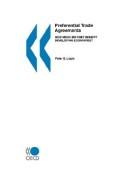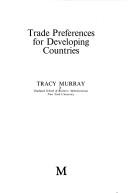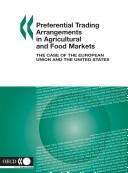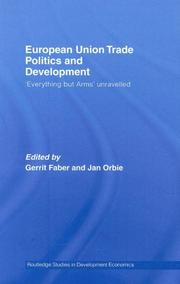| Listing 1 - 10 of 10 |
Sort by
|
Book
ISBN: 9264009353 Year: 2005 Publisher: Paris : Organisation de cooperation et de developpement economiques,
Abstract | Keywords | Export | Availability | Bookmark
 Loading...
Loading...Choose an application
- Reference Manager
- EndNote
- RefWorks (Direct export to RefWorks)
Les pays en développement redoutent que les réductions tarifaires multilatérales ne pénalisent leur secteur agricole à cause de l'érosion des préférences. Ce rapport indique que même si ce risque peut exister pour certains pays et certains secteurs, d’autres facteurs que les régimes préférentiels peuvent limiter les exportations de ces pays. L'ouvrage apporte des informations sur l’ampleur du recours des pays en développement à une série de régimes préférentiels non réciproques mis en place par l’Union européenne et les États-Unis. Les données secondaires sont complétées par des entretiens menés auprès des intervenants de ces marchés, qui viennent éclairer les résultats empiriques exposés. Les préférences accordées aux pays d’Afrique font l’objet d’une section spéciale proposant un état des lieux pour ce groupe de pays en développement.
Electronic books. -- local. --- Tariff preferences -- Economic aspects. --- Tariff preferences -- European Union countries. --- Tariff preferences -- United States. --- Commerce --- Business & Economics --- International Commerce --- Tariff preferences --- Economic aspects. --- Differential duty --- Discriminating duty --- Generalized system of preferences (Tariff) --- GSP (Tariff) --- Preferences, Tariff --- Preferential duty --- Preferential tariff --- Trade preferences --- Tariff --- European Union --- United States

ISBN: 1281720852 9786611720858 9264033696 9264033688 Year: 2007 Publisher: Paris, France : OECD,
Abstract | Keywords | Export | Availability | Bookmark
 Loading...
Loading...Choose an application
- Reference Manager
- EndNote
- RefWorks (Direct export to RefWorks)
This report aims to answer two major questions: (1) How beneficial are the trade preferences provided to developing countries; and (2) what are the implications of possible erosion of these benefits under multilateral trade liberalisation? The report focuses on trade preferences provided by the so-called Quad countries (Canada, the European Union, Japan and the United States) because they have some of the world’s highest tariffs on agricultural commodities. Findings from this study suggest that although preferential margins will be eroded with multilateral liberalisation, this may be a problem only for certain countries and within specific sectors, and that factors not related to preferential trade schemes may be limiting the exports of the least-developed countries (LDC).
Developing countries -- Commerce. --- Free trade. --- Tariff preferences. --- Trade blocs. --- Tariff preferences --- Trade blocs --- Free trade --- Commerce --- Business & Economics --- International Commerce --- Free trade and protection --- Trade, Free --- Trade liberalization --- Regional economic blocs --- Regional trading blocs --- Trading blocs --- Differential duty --- Discriminating duty --- Generalized system of preferences (Tariff) --- GSP (Tariff) --- Preferences, Tariff --- Preferential duty --- Preferential tariff --- Trade preferences --- International trade --- Tariff --- Canada --- European Union --- Japan --- United States
Book
ISBN: 1462311385 1452787417 9786612842535 1451871783 1282842536 1451916140 Year: 2009 Publisher: [Washington D.C.] : International Monetary Fund,
Abstract | Keywords | Export | Availability | Bookmark
 Loading...
Loading...Choose an application
- Reference Manager
- EndNote
- RefWorks (Direct export to RefWorks)
The literature measuring the impact of Preferential Trade Agreements (PTA) and WTO membership on trade flows has produced remarkably diverse results. Rose's (2004) seminal paper reports a range of specifications that show no WTO effects, but Subramanian and Wei (2007) contend that he does not fully control for multilateral resistance (which could bias WTO estimates). Subramanian and Wei (2007) address multilateral resistance comprehensively to report strong WTO trade effects for industrialized countries but do not account for unobserved bilateral heterogeneity (which could inflate WTO estimates). We unify these two approaches by accounting for both multilateral resistance and unobserved bilateral heterogeneity, while also allowing for individual trade effects of PTAs. WTO effects vanish and remain insignificant throughout once multilateral resistance, unobserved bilateral heterogeneity, and individual PTA effects are introduced. The result is robust to the use of alternative definitions and coding conventions for WTO membership that have been employed by Rose (2004), Tomz et al. (2007), or by Subramanian and Wei's (2007).
Commerce --- Business & Economics --- International Commerce --- Terms of trade. --- Tariff preferences. --- Differential duty --- Discriminating duty --- Generalized system of preferences (Tariff) --- GSP (Tariff) --- Preferences, Tariff --- Preferential duty --- Preferential tariff --- Trade preferences --- Tariff --- Competition, International --- Prices --- Exports and Imports --- Trade Policy --- International Trade Organizations --- Empirical Studies of Trade --- Trade: General --- International economics --- Trade agreements --- Trade balance --- Plurilateral trade --- Imports --- North American Free Trade Agreement --- Commercial treaties --- Balance of trade --- International trade --- Luxembourg
Book
ISBN: 1462333605 145275716X 1283517647 9786613830098 1451913818 Year: 2008 Publisher: Washington, D.C. : International Monetary Fund,
Abstract | Keywords | Export | Availability | Bookmark
 Loading...
Loading...Choose an application
- Reference Manager
- EndNote
- RefWorks (Direct export to RefWorks)
Trade theories covering Preferential Trade Agreements (PTAs) are as diverse as the literature in search of their empirical support. To account for the model uncertainty that surrounds the validity of the competing PTA theories, we introduce Bayesian Model Averaging (BMA) to the PTA literature. BMA minimizes the sum of Type I and Type II error, the mean squared error, and generates predictive distributions with optimal predictive performance. Once model uncertainty is addressed as part of the empirical strategy, we report clear evidence of Trade Creation, Trade Diversion, and Open Bloc effects. After controlling for natural trading partner effects, Trade Creation is weaker - except for the EU. To calculate the actual effects of PTAs on trade flows we show that the analysis must be comprehensive: it must control for Trade Creation and Diversion as well as all possible PTAs. Several prominent control variables are also shown to be robustly related to Trade Creation; they relate to factor endowments and economic policy.
International trade --- Commercial treaties --- Tariff preferences --- Differential duty --- Discriminating duty --- Generalized system of preferences (Tariff) --- GSP (Tariff) --- Preferences, Tariff --- Preferential duty --- Preferential tariff --- Trade preferences --- Tariff --- Trade agreements (Commerce) --- Competition, International --- Foreign trade regulation --- Treaties --- Reciprocity (Commerce) --- Econometric models. --- Exports and Imports --- Econometrics --- Trade Policy --- International Trade Organizations --- Empirical Studies of Trade --- Bayesian Analysis: General --- International economics --- Bayesian inference --- Trade balance --- Trade agreements --- Plurilateral trade --- North American Free Trade Agreement --- Customs unions --- Bayesian models --- Econometric analysis --- Balance of trade --- Protectionism --- Econometric models --- Chile

ISBN: 0333189701 0333189698 9780333189702 Year: 1977 Publisher: London Macmillan
Abstract | Keywords | Export | Availability | Bookmark
 Loading...
Loading...Choose an application
- Reference Manager
- EndNote
- RefWorks (Direct export to RefWorks)
Foreign trade policy --- Developing countries --- Tariff --- Tariff preferences --- 339.54 --- 339.96 --- 800 Collectie Vlaams Vredesinstituut --- 813 Methodologie --- 822.1 Verenigde Naties --- 822.5 Europese Unie --- 825 Ontwikkelingssamenwerking --- 831 Internationale Politieke Economie --- 831.1 Handelspolitiek --- 882.4 Noord-Amerika --- 883.2 Oost-Azië --- Buitenlandse economische politiek. Buitenlandse handelspolitiek. Instrumentarium van de buitenlandse handel --- Ontwikkelingshulp. Ontwikkelingssamenwerking. Ontwikkelingsproblematiek --- 339.96 Ontwikkelingshulp. Ontwikkelingssamenwerking. Ontwikkelingsproblematiek --- 339.54 Buitenlandse economische politiek. Buitenlandse handelspolitiek. Instrumentarium van de buitenlandse handel --- Differential duty --- Discriminating duty --- Generalized system of preferences (Tariff) --- GSP (Tariff) --- Preferences, Tariff --- Preferential duty --- Preferential tariff --- Trade preferences

ISBN: 1280356480 9786610356485 9264009337 9264009329 Year: 2005 Publisher: Paris : Organisation for Economic Co-operation and Development,
Abstract | Keywords | Export | Availability | Bookmark
 Loading...
Loading...Choose an application
- Reference Manager
- EndNote
- RefWorks (Direct export to RefWorks)
Developing countries are concerned that multilateral tariff reductions will harm their agricultural sectors because of preference erosion. The findings in this report suggest that although this may indeed be a problem for some countries in some sectors, factors other than preferential schemes may be limiting developing country exports. The report provides information on the extent to which developing countries have used selected, non-reciprocal preferential trading schemes provided by the EU and the US. Secondary data are complemented by interviews with market operators further clarifying the empirical findings. A special section has been devoted to the preferences granted to African countries highlighting the conditions for this set of developing countries.--Publisher's description.
Farm produce -- Marketing. --- Food industry and trade. --- Tariff preferences -- Economic aspects. --- Tariff preferences -- European Union. --- Tariff preferences -- United States. --- Tariff preferences --- Farm produce --- Food industry and trade --- Commerce --- Business & Economics --- International Commerce --- Economic aspects --- Marketing --- Economic aspects. --- Marketing. --- Food preparation industry --- Food processing industry --- Food trade --- Agricultural marketing --- Marketing of farm produce --- Differential duty --- Discriminating duty --- Generalized system of preferences (Tariff) --- GSP (Tariff) --- Preferences, Tariff --- Preferential duty --- Preferential tariff --- Trade preferences --- Agricultural processing industries --- Processed foods --- Agriculture --- Tariff --- Food --- Food processing --- Food technology --- Processing --- European Union --- United States
Book
ISBN: 1451862709 1462368999 1451908067 9786613823649 1452750157 128344979X Year: 2006 Publisher: [Washington, D.C.] : International Monetary Fund, Research Dept.,
Abstract | Keywords | Export | Availability | Bookmark
 Loading...
Loading...Choose an application
- Reference Manager
- EndNote
- RefWorks (Direct export to RefWorks)
This paper assesses the effects of reducing tariffs under the Doha Round on market access for developing countries. It shows that for many developing countries, actual preferential access is less generous than it appears because of low product coverage or complex rules of origin. Thus lowering tariffs under the multilateral system is likely to lead to a net increase in market access for many developing countries, with gains in market access offsetting losses from preference erosion. Furthermore, comparing various tariff-cutting proposals, the research shows that the largest gains in market access are generated by higher tariff cuts in agriculture.
Electronic books. -- local. --- Exports -- Developing countries -- Econometric models. --- Tariff preferences -- Developing countries -- Econometric models. --- Tariff preferences --- Exports --- Econometric models. --- Differential duty --- Discriminating duty --- Generalized system of preferences (Tariff) --- GSP (Tariff) --- Preferences, Tariff --- Preferential duty --- Preferential tariff --- Trade preferences --- International trade --- Tariff --- Exports and Imports --- Taxation --- Economic Theory --- Trade Policy --- International Trade Organizations --- Empirical Studies of Trade --- Economic Integration --- Trade: General --- Neoclassical Models of Trade --- Agriculture: Aggregate Supply and Demand Analysis --- Prices --- Public finance & taxation --- International economics --- Economic theory & philosophy --- Tariffs --- Comparative advantage --- Demand elasticity --- Imports --- Taxes --- Economic theory --- Elasticity --- Economics --- United States
Book
ISBN: 1462326544 1452731942 1283514907 1451913486 9786613827357 Year: 2008 Publisher: Washington, D.C. : International Monetary Fund,
Abstract | Keywords | Export | Availability | Bookmark
 Loading...
Loading...Choose an application
- Reference Manager
- EndNote
- RefWorks (Direct export to RefWorks)
This paper estimates the impact of the tariff liberalization in four largest CARICOM countries (Barbados, Guyana, Jamaica, and Trinidad and Tobago) on their trade flows. I trace changes in the product-line imports from CARICOM and non-CARICOM countries against time and commodity-level variation in external tariffs. I find that in each country the reduction of the external tariff, which eroded preferences enjoyed by member imports, increased the ratio of imports from non-member countries to imports from member countries. In Trinidad and Tobago, the higher ratio was largely the result of non-member imports crowding out member imports. In the three other countries, the ratio increased mainly because of higher non-member imports; there is little evidence that tariff reductions had an impact on member imports. Findings suggest that in Trinidad and Tobago liberalization of the external tariff reversed some of the trade diversion effects of CARICOM.
Tariff --- Tariff preferences --- Imports --- International trade --- Ad valorem tariff --- Border taxes --- Customs (Tariff) --- Customs duties --- Duties --- Fees, Import --- Import controls --- Import fees --- Tariff on raw materials --- Commercial policy --- Indirect taxation --- Revenue --- Customs administration --- Favored nation clause --- Non-tariff trade barriers --- Reciprocity (Commerce) --- Differential duty --- Discriminating duty --- Generalized system of preferences (Tariff) --- GSP (Tariff) --- Preferences, Tariff --- Preferential duty --- Preferential tariff --- Trade preferences --- Econometric models. --- Investments: Commodities --- Exports and Imports --- Public Finance --- Taxation --- Trade: General --- Trade Policy --- International Trade Organizations --- Commodity Markets --- International economics --- Public finance & taxation --- Investment & securities --- Tariffs --- Commodities --- Valuation, origin and classification --- Trade liberalization --- Commercial products --- Customs appraisal --- Trinidad and Tobago
Book
ISBN: 1462311350 1452769214 1282845489 9786612845482 1451963793 Year: 2010 Publisher: Washington, D.C. : International Monetary Fund, Middle East and Central Asian Department,
Abstract | Keywords | Export | Availability | Bookmark
 Loading...
Loading...Choose an application
- Reference Manager
- EndNote
- RefWorks (Direct export to RefWorks)
This paper examines the macroeconomic effects of the erosion of trade preferences, with a focus on the export of Caribbean bananas to Europe. Estimates are made of the magnitude of implicit assistance provided over a period of three decades to eastern Caribbean countries through banana trade preferences. The value of such assistance rose until the early 1990s, and has declined precipitously since then. Using vector autoregressive analysis, the paper finds that changes in the level of implicit assistance have had a considerable macroeconomic impact, especially on Caribbean real GDP growth.
Banana trade --- Tariff preferences --- Free trade --- Caribbean Area --- Commercial policy. --- Free trade and protection --- Trade, Free --- Trade liberalization --- International trade --- Banana industry --- Fruit trade --- Differential duty --- Discriminating duty --- Generalized system of preferences (Tariff) --- GSP (Tariff) --- Preferences, Tariff --- Preferential duty --- Preferential tariff --- Trade preferences --- Tariff --- Caribbean Free Trade Association countries --- Caribbean Region --- Caribbean Sea Region --- West Indies Region --- Investments: Commodities --- Exports and Imports --- Taxation --- Agriculture: General --- Trade Policy --- International Trade Organizations --- Trade: General --- Investment & securities --- International economics --- Public finance & taxation --- Agricultural commodities --- Trade relations --- Exports --- Tariffs --- Farm produce --- Commercial policy --- United States

ISBN: 9780415426275 0415426278 9780203934043 9781134092536 9781134092574 9781134092581 9781138806290 Year: 2007 Publisher: London Routledge
Abstract | Keywords | Export | Availability | Bookmark
 Loading...
Loading...Choose an application
- Reference Manager
- EndNote
- RefWorks (Direct export to RefWorks)
Foreign trade policy --- European Union --- Developing countries --- 266 Europese externe betrekkingen --- ontwikkelingssamenwerking --- EEC / European Union - EU -Europese Unie - Union Européenne - UE --- 382.0 --- 338.340 --- 334.153.0 --- Algemeenheden. Techniek en praktijk van de internationale handel. Internationale economische betrekkingen. --- Algemene ontwikkeling in de Derde Wereld. --- Betrekkingen tussen de Europese Gemeenschappen en de geassocieerde of derde landen: algemeenheden. --- Free trade --- Tariff preferences --- Law and legislation --- Economic conditions. --- Differential duty --- Discriminating duty --- Generalized system of preferences (Tariff) --- GSP (Tariff) --- Preferences, Tariff --- Preferential duty --- Preferential tariff --- Trade preferences --- Tariff --- Betrekkingen tussen de Europese Gemeenschappen en de geassocieerde of derde landen: algemeenheden --- Algemene ontwikkeling in de Derde Wereld --- Algemeenheden. Techniek en praktijk van de internationale handel. Internationale economische betrekkingen
| Listing 1 - 10 of 10 |
Sort by
|

 Search
Search Feedback
Feedback About UniCat
About UniCat  Help
Help News
News